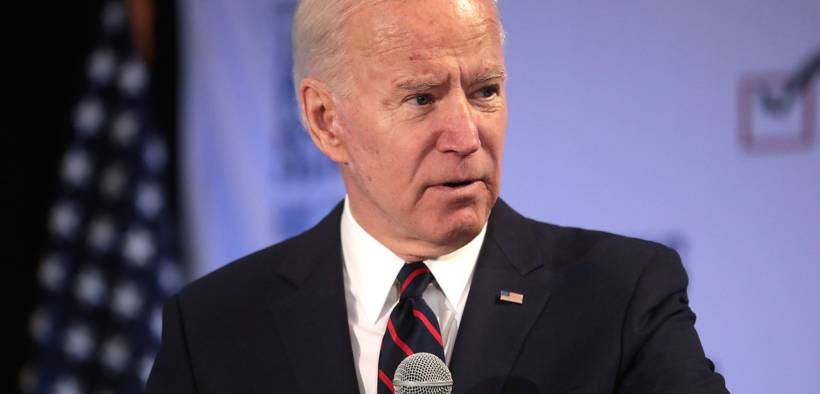Health Insurance Stocks Surge After Biden’s Strong Super Tuesday

“Biden received the most money in the Democratic field from insurance and pharmaceutical employees, while Sanders received the least. He kicked off his campaign with a fundraiser hosted by a health insurance executive, and one of Biden’s campaign aides is a former health care lobbyist.”
The health insurance industry led U.S. stock gains on Wednesday after Joe Biden’s strong Super Tuesday performance gave him the edge over rival Bernie Sanders, whose plan to implement Medicare for All poses an existential threat to private health insurance corporations.
Biden seeks to expand Obama’s Affordable Care Act, which would be profitable for the companies with ties to government health-care programs. Notably, the industries who most benefit from the U.S. health care system wrote the ACA legislation and strongly influenced the regulations and waivers inscribed in the law. Elizabeth Fowler, the chief architect of the bill, was a lobbyist at health insurance provider WellPoint before working on the legislation and returned to the health insurance industry at Johnson & Johnson after overseeing its implementation.
“Insurers Anthem Inc. and UnitedHealth Group Inc. both had the biggest gain since Oct. 2008, climbing as much as 16% and 13% respectively.
Centene Corp. also climbed, rising as much as 17%, shaking off a disappointing 2020 forecast on Tuesday night. Citi’s Ralph Giacobbe opened a positive catalyst watch on the stock last night, calling Super Tuesday and the guidance a “clearing event” for Centene. Bernstein’s Lance Wilkes said insurers with ties to Medicaid and health-care exchanges should fare particularly well.
Humana Inc. and Cigna Corp. also posted double-digit gains, rounding out the top five performers on the S&P 500 Index Wednesday morning. EHealth Inc., a company with an online comparison tool for Medicare plans, rose as much as 9%.”
Congratulations to all those Joe Biden supporters! pic.twitter.com/EfkOpyOZJr
— Matt Stoller (@matthewstoller) March 4, 2020
Biden’s big Super Tuesday “will spur positive returns across the health-care insurance peer group,” Jared Holz, a health-care strategist at Jefferies, told Bloomberg. Holz added that the Democratic primary remains a “a fluid situation,” that is difficult to predict, as “this week has already proven, major shifts in campaign forces can occur in a blink.”
As Branko Marcetic wrote last July, the Biden campaign is closely tied to the health care industry:
“An In These Times investigation from July found that Biden received the most money in the Democratic field from insurance and pharmaceutical employees, while Sanders received the least. He kicked off his campaign with a fundraiser hosted by a health insurance executive, and one of Biden’s campaign aides is a former health care lobbyist.”
While Biden took the lead from Sanders on Super Tuesday, exit polling data showed majority support for eliminating private insurance and replacing it with a universal government plan.
A government plan for all instead of private insurance,
Support/Oppose:
VT: 73%/23%
ME: 69%/28%
TX: 63%/33%
MN: 62%/35%
CO: 57%/36%
CA: 57%/36%
NC: 55%/41%
OK: 53%/43%
TN: 52%/44%
AL: 51%/43%
VA: 52%/45%
MA: 50%/45%@CNN Exit Pollshttps://t.co/sjyDdhHNMa https://t.co/Xm0GheJTNj— Political Polls (@Politics_Polls) March 4, 2020
Voters consistently cite healthcare as their most important issue. At around 18% of GDP, American per capita health care expenditures are more than twice the average of the 35 advanced countries in the Organization for Economic Cooperation and Development (OECD). Yet despite outspending these countries, the U.S. “has the lowest life expectancy, the greatest incidence of chronic illnesses, and the highest infant, child, and maternal mortality rates” in the OECD, according to economist Robert H. Frank.
A Harvard study found that 45,000 Americans die per year because they are uninsured. According to the American Journal of Public Health, medical bills or missed work from illness drive 500,000 Americans into bankruptcy every year. Meanwhile, new research from the medical journal Lancet shows that Medicare for All would save more than 68,000 lives and $450 billion a year
“No developed country other than the United States relies on largely unregulated insurance companies for the provision of health care,” Economist Robert H. Frank told Evonomics last year, citing America’s weakly regulated profit-driven health care model as the reason for higher costs and worse outcomes.


















What a surprise. An American politician in the back pocket of Big Money.